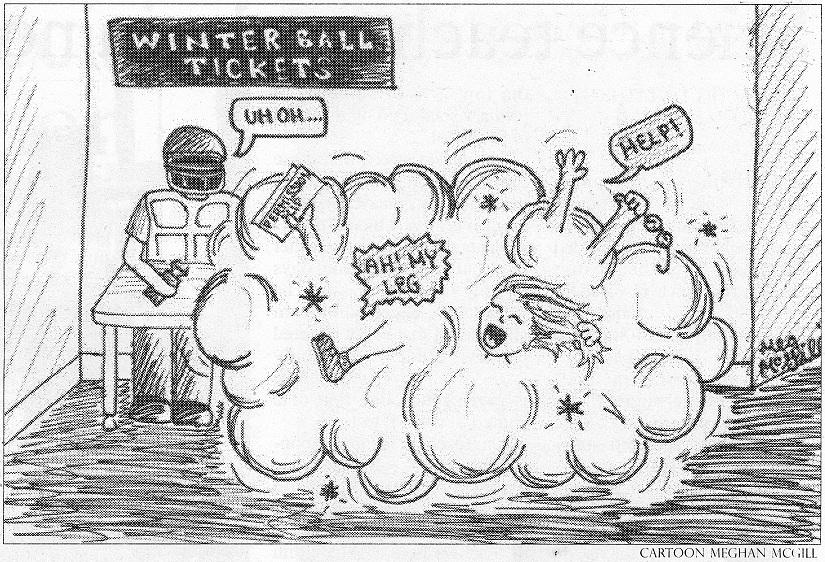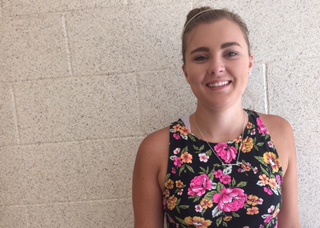School event attendance declines: Winter Ball cancelled due to lack of participation
An editorial cartoon from the December 2006 issue of the Harbinger depicts the popularity of Winter Ball when tickets often sold out for the dance. Comparatively, last year, few tickets were sold. This year, the Student Council decided not to hold the event due to past low interest.
December 1, 2015
The popularity of school events has declined as students’ busy schedules and dependency on technology redefine Algonquin’s culture; attendance of many events has lowered, leading to the cancellation of this year’s Winter Ball.
The list of disappearing dances has grown tremendously over the years, with Winter Ball being the newest addition.
According to junior and three term class president Brendan Foley, Winter Ball has been a tradition for more than 20 years and will be replaced with a new event. The replacement has yet to be chosen, but is planned to take place during the winter months and is hoped to reignite the culture at Algonquin once again.
“Certain culturally important dances [had] stayed steady: Homecoming, Winter Ball and of course the prom; but then there would be [steering committee sponsored] dances that were popular and then you started to see those things fade away,” social studies teacher and student council adviser John Barry said.
Class of 2015 alumna and four term class president Emily Lowe notes that social media, although often a motivator for students to attend events, hinders the overall experience.
“Everyone loves dressing up for the prom because they can have Instagram pictures for years,” Lowe said. “I honestly think if Instagram wasn’t a thing, then prom wouldn’t be a thing either. A lot of events lose their momentum when people are on their phones not really paying attention to what is happening around them.”
According to Barry, social media has changed the way students look at school events. The smartphone has created a platform for millennials to be entertained at the press of a button, while school events take time and dedication which may, according to Barry, impact the types of events students run.
“A variety show takes a lot of time, it takes a lot of commitment, it takes a lot of discipline, it takes a lot of perseverance… kids are losing that sense of perseverance,” Barry said.
According to business teacher and two time class adviser Patricia Riley, scheduling demands on high school students are intense.
“Kids are busy,” Riley said. “They are not only trying to do well in school, but they are involved in many clubs, sports, they work, so to come back for an event is difficult.”
“Now there are so many other things to do that dances are not a priority,” Assistant Principal Mel Laughton said.
The diminished interest in school events marks a change in the high school culture. According to Barry, in the past students were eager to spend time with peers at school events, but the definition of time well spent has changed.
“It is about the cultural definition of what time well spent with your peers actually is. Let’s face it, it is possible that there are things you can do outside of the school on Friday that are not permitted inside the school,” Barry said.
Many students feel that school events no longer fit the definition of a good time. For many students a Friday night is defined by going out, being with friends and letting loose.
“A good Friday night would be spent with friends laughing, eating good food somewhere we have not been before,” sophomore Isabella Masciarelli said. “[School events are] less personal. You have so many other people around. You’re forced to be around people that may not be your friends.”
Student opinions have led Barry to believe that the issue lies much deeper than school events.
“It [the lack of interest in school activities] is not a dance issue but it’s how come we can’t do something that brings us all in together,” Barry said.
According to Barry, students’ lack of interest in school events is redefining the Algonquin culture.
“Long gone are the [events] that bring together all the delicious groups that make up high schools in history,” Barry said.
“[Groups have become] more and more independent and less likely to be united as a school,” Lowe said. “This has greatly changed the meaning of being a T-Hawk… Instead of being a close knit community, it has become a bunch of small groups who occasionally come together.”










